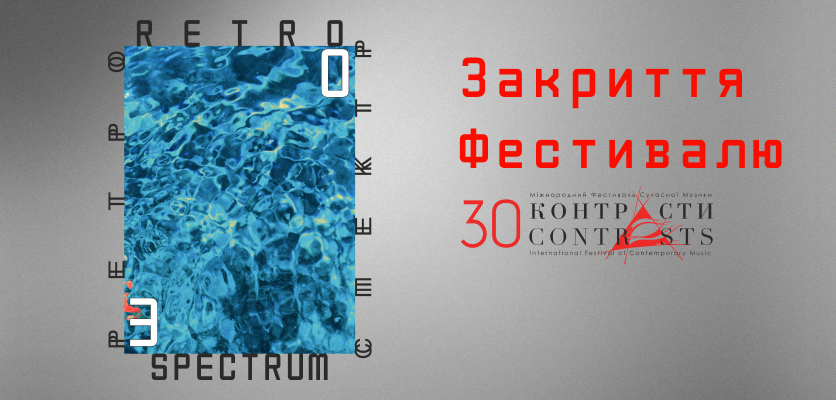Контрасти 30. Закриття Фестивалю
Концертний зал ім. С. Людкевича
190–290

Виконавці:
- Анна Іванюшенко, клавесин
- Академічний камерний оркестр «Віртуози Львова»
- Вінсент Козловський, диригент
Програма:
- Збіґнєв Буярський (1933–2018, PL), «Musica Domestica» (1977)
- Юрій Пікуш (*1998, UA). «Terra Clastri» для клавесина і струнного оркестру (2024). Світова прем’єра
- Олег Безбородько (*1973, UA). «Казка королів» для струнного оркестру за однойменною картиною Мікалоюса Чюрльоніса (2003, 2007)
- Любава Сидоренко (*1979, UA). «Octagon» для струнного оркестру (2014)
- Євген Станкович (*1942, UA). Симфонія № 1 «Sinfonia Larga» для струнних (1973)
Модераторка – Поліна Кордовська
Чи завжди різноманіття означає розбрат? Століттями мистецтво лишається простором, де одночасно можуть продовжуватись різні стилі та течії, адже кожна з минулих епох лишила по собі слід, а отже і через тисячі років знайдуться охочі почути Моцарта, або відтворити його стиль. Три десятиліття фестиваль «Контрасти» попри сперечання закладене у назві обʼєднував. Створював спільноту спраглих до нової музики виконавців, композиторів, слухачів — однодумців. Показуючи, що нова музика може бути різною: написаною цьогоріч, або ж несправедливо забутою, може промовляти до нас мовою дисонансів, або ж близькими памʼяті мелодіями. Вона має численні напрямки, обирати серед яких дають можливість «Контрасти».
Аркою цьогорічних «Контрастів» стануть перша й остання події від Академічного камерного оркестру «Віртуозів Львова», який в останній вечір вийде на сцену під керівництвом ще одного незмінного учасника фестивалю — диригента Вінсента Блажея Козловського з Польщі. Тому одним з акцентів цієї програми стане п’єса польського композитора Збігнєва Буярського — «Musica Domestica». Буярський розповідає, що створив твір, який би відчувався, як омріяний, далекий і, можливо, навіть неіснуючий ідеальний дім, якого кожен з нас прагне. Особливого сентименту це надає завершенню фестивалю «Контрасти» — події, яка щороку на два тижні стає омріяним домом нової музики.
Символічно у концерті пролунає і твір учениці Збігнєва Буярського, відомої львів’янки Любави Сидоренко. Для неї, попри найбурхливіші зіткнення ворожих сил, музика набуває тонких звукописних рис та глибоко метафоричних, при цьому завжди обнадійливих, контекстів. Таким став і твір для восьми віолончелей «Octagon», що в оркестровій версії звучатиме на фестивалі вдруге з 2014 року.
Прагнення оприявнити музичне в живописі та в нотних знаках зберегти авторську рефлексію на образи фарб Мікалоюса Чюрльоніса призвело до появи твору іншого відомого композитора, киянина Олега Безбородька. У «Казці королів», як зауважує автор, він відтворив атмосферу «з присмаком північного вітру» спершу лише у звуках, а вже після компонування, пригадавши знамениту картину литовського художника й — також композитора, — поєднав долі цих артефактів.
Тим часом у новоствореній музиці для клавесина й струнних молодий митець з Дніпра, переможець Другого Всеукраїнського композиторського конкурсу імені Мирослава Скорика Юрій Пікуш намагався знайти тонкі нитки взаємодії тембрів інструментів, що химерно переплітаються, блукаючи уявною планетою Terra Cla (весин) Stri (ngs). Форма цього твору складається з кількох контрастних епізодів, які чергуються, але щоразу постають в оновленому вигляді. У певний момент струнні та клав сягають максимально високого регістру, немов би намагаючись вирватись за грані своєї terra… Проте чи зможуть вони перебороти межу своїх можливостей, чи під силою непереборного тяжіння повернуться на круги своя, слухач зможе зрозуміти лиш в самому кінці.
«Sinfonia Larga» Євгена Станковича також свого часу стала випробовуванням на міцність, адже саме Симфонії №1 доля пророкувала стати джерелом, з якого розпочався неповторний стиль композитора, яка зібрала воєдино та стала раннім віддзеркаленням усіх констант творчості сучасного Станковича. І, зрештою, в якій ми зараз можемо шукати відповіді на те, як виростали титани нової української музики. Немов передбачаючи це, Станкович дає їй програмну назву, наголошуючи не лише на темпі, а й позначаючи величний характер — Larga, монументуючи сталість та витривалість мистецтва до викликів наступних епох.
Марія Левкович, Дзвенислава Саф’ян






